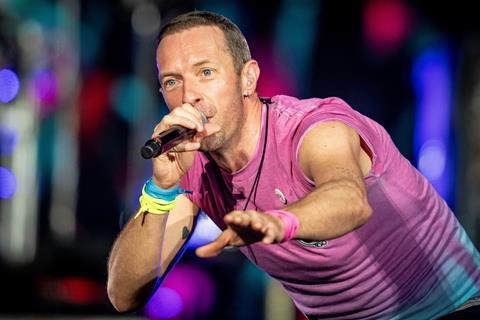Chris Martin reportedly grew up in the church and has long written lyrics infused with biblical imagery. Coldplay’s new song ‘We pray’ articulates a spiritual hunger that many resonate with, says Robin Ham. It’s time to point them to the one who hears those prayers.

When Coldplay debuted their new single ‘We pray’ live at Glastonbury this summer, many reflected that the global superstars, long known for their existential lyrics, may have given us their most religious song to date.
Singing alongside a troop of collaborators, including Little Simz, Burna Boy, Elyanna and TINI, Chris Martin borrows straight from the Bible, describing modern day life as living in “the valley of the shadow of death” (Psalm 23).
But is the track a call to a higher power, a plea for help, or just a moment of post-modern introspection?
How to Pray
You might recall how Google searches for ‘how to pray’ spiked during the first few months of lockdown. As Madeleine Davies reported in the New Statesman last week, it does feel like we’re operating in a very different spiritual landscape to, say, a decade ago.
In a time when the ‘thoughts and prayers’ mantra has become a cultural cliché, could Coldplay be reclaiming the power of prayer? Fascinatingly, a few days ago the band uploaded a ‘Blank Verse Version’ to YouTube, suitable for listeners (and fellow pray-ers?) to add their own verse/prayer.
Who said liturgy is dead? Spontaneity is often celebrated, but there’s clearly something powerful about joining in with someone else’s words. Coldplay may have stumbled upon a perfect combination, modelling crafting your own prayer alongside joining in with a corporate refrain.
So, what would your verse be?
What to pray
The repeated refrain of the chorus to ‘We pray’ is an unavoidable cry for help:
“And so we pray / for someone to come and show me the way / And so we pray / for some shelter and some records to play / And so we pray / we’ll be singing “Baraye” / Pray that we make it to the end of the day / And so we pray / I know somewhere that Heaven is waitin’ /And so we pray / I know somewhere there’s something amazin’ / And so we pray / I know somewhere we’ll feel no pain / Until we make it to the end of the day”
“We’ll be singin’ ‘Baraye’” references the song ‘Baraye’, which became an anthem in Iran after Mahsa Amini, a 22-year old Iranian woman, died in police custody after being arrested for allegedly wearing her hijab improperly.
In the first verse, “Pray Virgilio wins” refers to the case of Virgilio Aguilar Mendez, a teen migrant from Guatemala accused of causing the death of a Florida police officer. Charges against him were later dropped.
Perhaps the real question is: to whom are we praying?
Coldplay are to be commended for their willingness to publicly lament for all that is broken in our world - something the Church has not always done so well. This spiritual yearning for what Christians would call ‘redemption’ and ‘restoration’ articulates something more substantial than simply a hope for a humanist solution.
‘We pray’ cries out to the heavens for “someone to come and show me the way”, before concluding: “I know somewhere that heaven is waiting…I know somewhere there’s something amazing…I know somewhere we’ll feel no pain.”
The scientist with a head full of dreams
With chart-topping hits that wrestle with love and loss, to albums that sound like soundtracks to a cosmic journey, Coldplay have never shied away from an underlying current of spiritual searching. Their 2019 album, Everyday Life, included psalm-like lyrics such as “Holy, holy, God defend / shield me, show me / when I need a friend” (‘When I need a friend’) and “Oh the Lord will shine a light” (‘BrokEn’). Their 2008 hit ‘Viva la vida’ was packed with religious imagery.
It’s been frequently reported that lead singer Chris Martin grew up in a Christian home, but in media interviews he has tended to articulate something akin to a generic belief in the divine.
As far back as 2008, Martin described himself to Independent.ie as an “alltheist”, a clever term that the songwriter apparently coined himself. He told The Times that he thinks “God is the magic in every molecule, even in people you don’t like.” Martin even has ‘God is Love’ tattooed on his arm (apparently a creative adaptation of the ‘G’ tattoo, originally for his ex-wife Gwyneth Paltrow).
Chris Martin's new tattoo ! I love it !!!! @coldplay best tattoo ever !!!!!#lovecoldplayalways pic.twitter.com/EkgI9gyjB3
— abigail (@jcwg) April 23, 2015
In a 2021 radio interview, Martin said: “God is everywhere and everyone and it’s also the unknowable, the vast majesty behind everything.”
“I don’t think that God is a man in the sky with a grey beard”, he added.
Now, some readers might spot that while Martin plays with Christian language in these quotes, they essentially boil down to pantheism by any other name. This is a heretical belief that matter itself is not simply created by God but is also divine in and of itself. And while the “grey beard” comment might be painting a clumsy caricature of Christianity, it clearly resonates with many who are wrestling with the vestiges of Christianity in the West.
Who to pray to
Perhaps the real question is: to whom are we praying? For Christians, it’s a loving father in heaven, infinitely personal and approachable through Jesus. And although ‘We pray’ doesn’t go as far as referencing God as father, it does hint of an unmerited relationship in lyrics such as: “Keep a smilin’ face / only by his grace”.
This spiritual yearning articulates something more than a hope for a humanist solution
In a culture seemingly learning to reframe its relationship with its spiritual heritage, and yet often consumed by the superficial, the track cuts through the noise with a call to something deeper - an invitation to connect with a divine presence that is not only near but profoundly personal.
This longing finds its most radical answer in the Christian gospel, where the divine is not abstract or generic, but the Word made flesh, stepping into our broken world and offering not just individual comfort but lasting transformation.
In a world teetering on the edge, perhaps what we truly need is not just to pray, but to recognise the one who hears.
This article was first published on Robin Ham’s blog The Happy Certainty. Read it in full here





































No comments yet